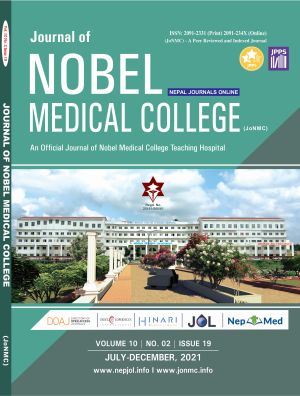Short Term Clinical Outcome of Micro Lumbar Discectomy in Tertiary Care Center
DOI:
https://doi.org/10.3126/jonmc.v10i2.41774Keywords:
Back Pain, Disc herniation, SciaticaAbstract
Background: Minimal invasive open lumbar microdiscectomy has been associated with good success rate and low morbidity. The present study is aimed to evaluate the clinical outcome of patients who underwent open minimal invasive open lumbar microdiscectomy for herniated intervertebral disc.
Materials and Methods: This is a prospective observational hospital based study of prolapsed lumbar intervertebral disc operated in the department of neurosurgery at Nobel Medical College Teaching Hospital, Biratnagar, Nepal from January 2018 to June 2021. All patients of lumbar herniated intervertebral disc subjected for surgery were included. Recurrent prolapsed intervertebral disc, Disc surgery requiring stabilization was excluded from the study. During surgery types of prolapsed intervertebral disc, level and operative time were noted. In the post-operative period Visual Analogue Scale was used to assess the change in severity of pain. Duration of hospital stay and the complications occurred were also noted.
Results: The mean age of the study population was was 41.50 (±14.56) years ranging from 20 years to 79 years. The commonest lumbar prolapsed intervertebral disc was at L4-L5 level. The mean operative time was 42 minutes excluding the time for anaesthesia preparation. There was statistically significant difference (p<0.001) in pre-operative and post-operative Visual Analogue Scale. Mean duration of hospital stay was 5.58 (1.87) days.
Conclusion: A through workup and surgical planning is associated with better outcome avoiding complications in minimal invasive open micro lumbar discectomy.
Downloads
Downloads
Published
How to Cite
Issue
Section
License

This work is licensed under a Creative Commons Attribution 4.0 International License.
JoNMC applies the Creative Commons Attribution (CC BY) license to works we publish. Under this license, authors retain ownership of the copyright for their content, but they allow anyone to download, reuse, reprint, modify, distribute and/or copy the content as long as the original authors and source are cited.




